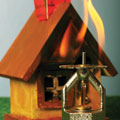
The
states of Montana and Pennsylvania have taken different approaches
recently concerning residential fire sprinkler mandates.
Within a one-week period, two governors had to make similar decisions regarding the life safety of their state’s citizens.
Montana and Pennsylvania passed self-serving legislation (for home builders) that prohibited the adoption of a residential code mandating fire sprinklers.
Montana Gov.Brian Schweitzerwas the first to act on the proposed legislation. Gov. Schweitzer vetoed the bill that would have prevented the adoption of a residential code mandating sprinklers. The governor very intelligently stated it was “because of serious public safety concerns.”
Not only did Gov. Schweitzer act as a courageous leader in vetoing this legislation, but he also displayed his intelligence in understanding the serious consequences to life safety in Montana if he signed the bill. It was easy to see this was self-serving legislation at its best. The governor said the state should proceed in the normal manner by having hearings regarding the adoption of a new residential code.
The Quaker State Change
Pennsylvania is somewhat different. The state had gone through the normal hearing process for adopting the 2009 ICC International Residential Code. The code requires sprinklers in townhouses immediately upon adoption. One- and two-family dwellings must have sprinklers if constructed after Jan. 1, 2011.Throughout the adoption process and the public hearings in Pennsylvania, the builders lost arguments regarding mandatory sprinklers. They pushed every button imaginable in order to remove the mandatory sprinkler requirements. In the end, they lost.
As of Jan. 1 of this year, the law required a residential sprinkler system in all one- and two-family dwellings in Pennsylvania. Yet, the home builders still opposed the requirement. When you lose on the administrative and technical level, what do you do? You pursue the political option.
Pennsylvania builders simply went to the legislature and provided it with the wording of a bill to reverse the adoption of the residential sprinkler requirement. The bill quickly went through the legislature.
It is interesting to note the day after the Pennsylvania representatives voted to approve the bill, seven Amish children died in a house fire. If the home had a residential sprinkler system, no one would have died in this fire. That did not seem to faze the Pennsylvania elected officials. Apparently, the loss of seven children in a fire is an acceptable statistic, as long as the builders do not have to install residential sprinkler systems in homes.
The Pennsylvania Senate did not take long to follow the lead of the House and passed the bill to reverse the sprinkler mandate. Additional fire deaths in Pennsylvania were presented to the Senate, but again, those are just “acceptable fire losses.” Who cares if innocent people die, as long as the self-serving home builders’ bill gains approval?
Newly elected Pennsylvania Gov.Tom Corbettwas presented the bill. When he received it, the governor had yet to sign any legislation since his election. The first bill Gov. Corbett signed was one to remove the sprinkler mandate in Pennsylvania. Is this a bill to be proud of as a first act as governor?
When signing the bill, Gov. Corbett called the legislation, “common sense.” How anyone could call hundreds of future fire deaths of innocent citizens common sense is beyond me. This is politics.
The Money Trail
A friend suggested I follow the money. What he meant was to go to the website www.followthemoney.com and see why our elected officials do what they do. Then it will be easier to understand politics.I did go to the website and it listed the campaign contributions of every elected official I plugged in. You will be surprised at some of the big dollar amounts. You may not be surprised to see who made those donations.
But all is not lost in Pennsylvania. Part of the legislation requires all home builders to offer residential sprinklers to their customers. Customers must sign a form opting out of including residential sprinklers in their new home.
Perhaps the governor’s comment about common sense meant the homebuyer could select the installation of residential sprinklers. Of course, if that is the case, he should have left the code the way it was and vetoed the bill. After all, the adoption did go through the process established by legislators. I guess the process is only good if the state adopts what the legislators’ campaign contributors like.
It bears mentioning all other residential buildings must be protected with sprinklers. That includes apartments, condominiums and townhouses. One still has to ask why we protect those living in multifamily dwellings and not those living in one- and two-family homes. Why are individual homeowners and their families less important to keep alive?
The fear for my sprinkler advocates is home builders in Pennsylvania will gouge their customers for residential sprinkler systems. That way builders can avoid putting them in.
Perhaps one of these days builders will figure out that safety and fire protection sells. You may recall Detroit carmakers were opposed to safety measures in automobiles. They fought Congress for years. One of the first vehicles I drove did not have seatbelts. Think of all the safety measures we have added since. Yet, Detroit fought most of the measures because people would stop buying new cars. Have you noticed they never stopped buying new cars?
Home builders use the same excuse. They have a history of opposing safety measures, such as when smoke detectors were first introduced. They also opposed hard-wired smoke detectors. They opposed CO detectors. The list goes on.
And that brings us back to the tale of two governors. One acted intelligently, vetoing the sprinkler prohibition bill. The other one used his version of “common sense.”
I often wonder how many additional innocent lives need to be lost in residential fires before real common sense prevails with elected officials. Unfortunately, it appears common sense is not too common anymore, especially when campaign contributions are involved.

